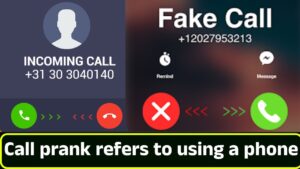Call prank refers to using a phone or a service
A call prank refers to using a phone or a service to make prank calls, typically to amuse oneself or others by tricking or startling the recipient. These pranks range from harmless jokes to more malicious forms of harassment. As technology has advanced, prank calls have evolved from simple human-to-human interactions into automated services that allow users to prank people with minimal effort. However, these services raise significant ethical and legal concerns, especially when the pranks cross the line into harassment or disturb someone’s privacy.

Types of Call Pranks
Prank calls come in various forms, each utilizing different techniques. Voice manipulation pranks involve altering the caller’s voice using software to disguise their identity or make the call sound ridiculous. Fake call generators simulate phone calls that appear legitimate but are actually pre-recorded or fabricated. Another type is recorded message pranks, where pre-recorded, often humorous messages are sent to a target. While these types of pranks may seem harmless, some can quickly escalate into more harmful territory.
More problematic are harassing pranks, where the intent is to annoy, confuse, or disturb someone repeatedly. These pranks can cause real emotional distress and are often seen as a violation of privacy, even though they are sometimes disguised as simple jokes.
Popular Call Prank Services
There are numerous call prank services available on the internet, each offering different features and pricing models. These services typically allow users to choose from various prank call templates or even create custom pranks with specific messages or voices. Some services offer paid subscriptions or per-call fees, while others offer free limited use. The technology behind these services involves spoofing caller IDs, using voice modulation, and sending pre-recorded audio clips, making the prank appear legitimate to the recipient.
Legal and Ethical Concerns
While prank calls may be fun for some, they can carry serious legal consequences. In many countries, prank calls that harass or disturb the recipient can result in criminal charges, including fines or even jail time. These laws are designed to protect people’s privacy and ensure that pranks do not cause unnecessary harm. Additionally, ethical concerns arise when a prank call crosses the line into emotional or psychological harm. Victims of prank calls may feel targeted, humiliated, or disturbed, and the effect can be long-lasting.
Some prank calls can even interfere with emergency services or other critical systems, further complicating the ethical implications. Pranksters often fail to realize that their actions might cause real-world consequences, such as distress or financial losses for businesses targeted by prank calls.
How Call Pranks Can Be Harmful
The potential harm caused by prank calls is significant. For individuals, the distress can be mental and emotional. Prank calls can cause confusion, anxiety, or even fear, especially if the recipient believes the call is real. For businesses, prank calls can disrupt operations, damage reputations, and cause financial losses, particularly if they cause employees to divert time and attention away from their work.
In some cases, prank calls can escalate into dangerous situations, such as involving emergency services, leading to false alarms or misdirected help. These types of pranks are illegal in many places and can result in criminal penalties. Furthermore, the psychological impact of receiving prank calls—especially repeated ones—can lead to long-term anxiety or paranoia.
Protecting Yourself from Call Pranks
There are several ways to protect oneself from call pranks. One of the most effective methods is to block unknown or suspicious numbers using smartphone features or apps designed to filter out unwanted calls. Many mobile devices and apps also allow users to report prank calls, which helps authorities track and prevent illegal activities. Additionally, people can avoid sharing personal phone numbers in public spaces to reduce the chances of being targeted.
In the event that a prank call turns into harassment or becomes threatening, it’s important to contact the authorities. They can investigate the incident and take appropriate legal action if necessary. Blocking the prankster and reporting their actions helps to prevent further distress.
Alternatives to Call Pranks
For those looking for harmless fun, there are plenty of alternative ways to engage in playful activities without crossing ethical boundaries. Social media platforms, creative games, or even non-disruptive surprise gifts can offer a more positive way to interact with others. Keeping pranks lighthearted and respectful is the best approach to ensuring everyone involved has fun without any negative consequences.
Conclusion
While call pranks can be entertaining for some, they raise significant concerns when they cross ethical lines or violate privacy laws. The technology behind these pranks allows for anonymity and creativity, but it also opens the door to harmful consequences. Individuals should be aware of the potential legal ramifications of prank calls and always respect the boundaries of others. By using technology responsibly and ensuring pranks are harmless, pranksters can keep their fun in check and avoid causing undue harm. Respect for privacy and consent should always be prioritized, ensuring that everyone involved enjoys the experience without facing negative impacts.
